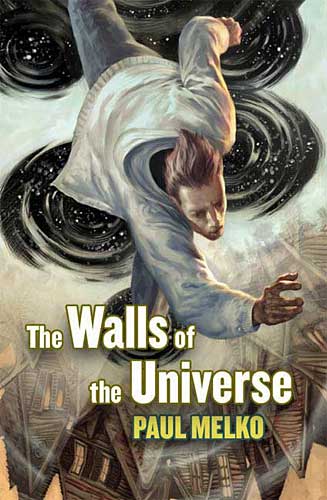SF author Paul Melko told Tor.com that his second novel, The Walls of the Universe, was the first novel he ever completed, but as is often the case with first books, it wasn’t good enough for publication.
“So I shrunk it down, distilled into a novella, that was very well received,” Melko said in an interview. “The novella went on to win the Asimov’s Readers Award for Best Novella. It also was nominated for the Hugo, Nebula, and Sturgeon Awards. When it came time to write a second novel, I took that novella and stretched it back into a novel, only much, much better than before.”
The Walls of the Universe uses parallel universes to explore the idea of nature versus nurture. “John Rayburn is an Ohio farmboy who comes face to face one evening with another version of himself,” Melko said. “This other John—John Prime—has a device that allows him to travel between worlds and he has an offer for the first John: be John Prime’s agent in his universe to make money with ideas from another universe. John is skeptical of course, but John Prime convinces him to use the universe-hopping device, only to discover that it’s broken and John Prime has tricked him out of his life. The story follows both characters—John Prime as he tries to fit into the life he’s been gone from for 12 months and the first John who has to figure how to get his life back.”
The primary influence for the book is The World of Tiers books by the late Philip Jose Farmer, Melko said. “[It] is a parallel universe series in which there are many pocket universes that are the play-things for god-like humans,” he said. “The subsequent books in my series will deal with the origin of the multiverse and have our protagonists uncover its creators and deal with all the other beings who are exploiting it. It’s been relatively easy for our hero so far.”
In Locus Magazine, reviewer Gary K. Wolfe said of The Walls of the Universe that it is “exactly the sort of thing you can hand to a non-SF reader with confidence”—which is exactly what Melko wants his fiction to be. “I want my fiction to be accessible, and I believe this book is more so than my first,” he said. “Singularity’s Ring is built on post-singularity fiction from recent years and required knowledge of those protocols. The Walls of the Universe is set in universes very similar to our own. The character could be any of us.”










